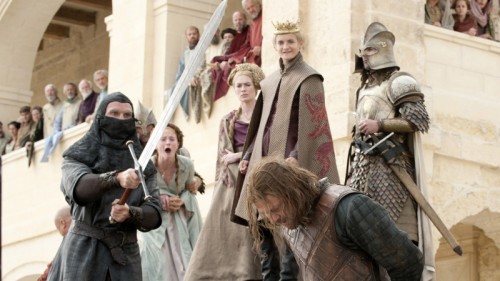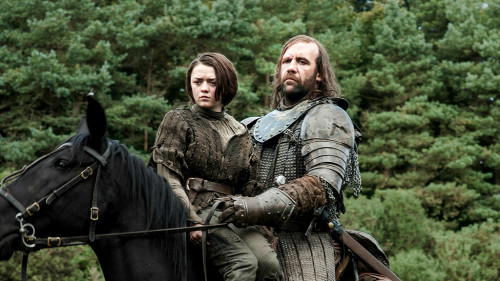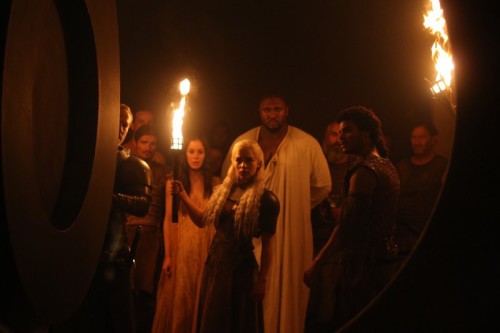I’M A HORROR FAN. I’ve been watching the “weirdies” (as my grandmother dubbed horror flicks) since I was a kid. I watched so many and talked about them so often that the Sisters of Christian Charity who taught at my elementary school called my mother in for a parent-teacher conference. Was there a problem at home? (There wasn’t.) As an adult, I’m still on the lookout for that special film which will have me digging my nails into the upholstery. That experience is harder to find in the age of the internet where overexposure has dampened our feelings.
I may have found what I’ve been looking for in Game of Thrones.
When I settled down to watch “Two Swords,” the Season Four premier of HBO’s mega-hit, I posted on Facebook, “No one should have to watch Game of Thrones alone.” (I wasn’t exactly alone. There were 6.6 million viewers of the 9 pm broadcast.) But there I was, in my apartment on a Sunday night, imagining 6.6 million people holding my hand as I huddled on my sofa, a box of Thin Mints (don’t judge!) at my side, watching with jaw clenched and toes curled. That kind of unbearable, nearly-painful suspense is what I imagine audiences felt when they first saw movies like The Exorcist, Psycho, The Last House on the Left and Night of the Living Dead.
Fans of George R. R. Martin’s A Song of Ice and Fire know (and will tell over and over and over again) that Martin’s world is not wanting for brutality. The television adaptation, created by David Benioff and D.B. Weiss (with Martin as Co-Executive Producer) has even bested some of the novel’s shocks, but pure brutality isn’t enough to keep us playing. Surprise doesn’t sustain drama, nor does it keep millions of fans engaged. In Game of Thrones, the horrific and the grievous, the heroic and the vengeful are part of a larger thematic map of a complex and sometimes confusing world. Game of Thrones doesn’t rise above its sensational moments, it makes them necessary. Characters have multi-layered motivation, decisions have consequences, and the plot twists keep the next big moment hidden. The surprises come but, on reflection, seem inevitable; if we are paying attention, clues have been there all along. The result is that viewers are constantly listening for danger in the subtext and watching for daggers at the corners of the screen… hoping (sometimes against hope) that their favorite characters will not suffer cruel ends.
*Now we begin Season 1-3 spoilers.
I’ll avoid anything I know about Season 4 and the rest of the novels.*
The shocking death of a lead character is a device used to unnerving effect in Hitchcock’s Psycho. In Game of Thrones, Ned Stark’s beheading at the end of Season One massacres expectation in the same way. The result is that Westeros is transformed from a fantasy kingdom into a real place — despite dragons, demon babies, and men with changing faces. To say “no one is safe” is trivial: the greater danger is that good might not triumph over evil. This will be no typical hero’s journey.

Game of Thrones: the execution of Ned Stark (l. to r. Sophie Turner, Lena Headey, Jack Gleeson, Sean Bean)
One of my friends has broken up with Game of Thrones. “I will not be Red Wedding’d again” he tells me. And there are others like him. From the torture of Theon Greyjoy to The Red Wedding, the cruelty feels helter-skelter. But Martin has a code. In his Westeros, the naïve are punished. It’s not really win or die, as Cersei declared in S1E7, it’s “learn or lose.” Game of Thrones suggests that cunning is more valuable than honor. The fallen Starks are those who haven’t learned fast enough. The Red Wedding, like so much of what happens to the Starks, makes integrity seem like naiveté. The Starks’ belief in honor is a noble trait which impairs their judgment, blinding them to the treachery of others.
While we wait for Bran’s coming-of-age and hope that Sansa will learn from Lannister chicanery, we cling to Arya who accepts her lessons, albeit with some belligerence. She is learning survival in a world that favors the cruel. Just a little experience a tiny bit earlier and she would have asked Jaqen to kill Tywin Lannister.
Arya’s evolution parallels the rise of the Valyrian queen, whose story feels most the most like a traditional hero’s journey. Daenerys is put through a gauntlet of tests, growing wiser, harder, and cooler with each lesson. Sure she makes mistakes but, inevitably, those mistakes involve punishment for those who mistake her for a fool. Underestimating your opponent is enough to get you killed by Martin’s law. The proud Kraznys of Astapor learns too late, having called Dany every slur in Valyrian. She allows him Pyrrhic victories all season before speaking to him in their mutual language and then setting her dragon upon him. The warlock Pyat Pree of Qarth suffers the same fate: burned alive.
My favorite moment in Dany’s story is also, I believe, the best example of learning one’s lessons well. Betrayed by both her serving girl and Xaro Xhoan Daxos who has seemed her only friend in Qarth, Dany must swallow a bitter pill when she discovers that even those closest might betray her. Angry and hurt, Dany remains a vision of calm as she understands the full extent of their treachery. “Thank you,” she says, locking them both in Xaro’s empty vault, “Thank you for teaching me this lesson.”
The incongruous lack of physical suffering among the Lannisters, on the other hand (pun intended), is proportionate with their cunning. Only Jaime and Tyrion have suffered any real physical harm. Jamie, clinging to the idea of himself as cock-of-the-walk, loses his fighting hand while Tyrion, trusting in honor as he defends the kingdom, is rewarded by an attempt on his life. Of the denizens of King’s Landing, Lord Varys is the most likely to survive: cunning enough to protect himself without pissing anyone off. We can hope that the Lannisters’ lust for power will find them justly punished: after all, hubris is another kind of foolishness.
I fear Game of Thrones will continue to hurt my feelings. Just as with any horror movie, a grim outcome is sometimes part of the bargain. Horror fans step willingly step into the darkness, knowing we may walk away shaken by a grim view of life. We hope that the outcome will be a relief but are satisfied when it is not. With A Song of Ice and Fire still unfinished, it remains to be seen if Martin equates hope with foolishness.




